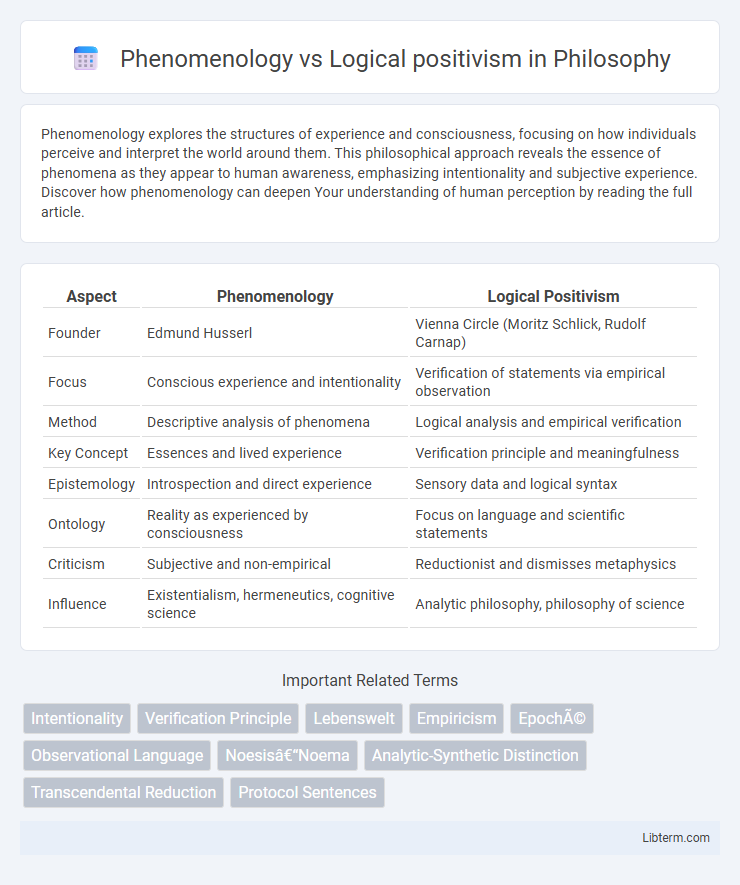Phenomenology explores the structures of experience and consciousness, focusing on how individuals perceive and interpret the world around them. This philosophical approach reveals the essence of phenomena as they appear to human awareness, emphasizing intentionality and subjective experience. Discover how phenomenology can deepen Your understanding of human perception by reading the full article.
Table of Comparison
| Aspect | Phenomenology | Logical Positivism |
|---|---|---|
| Founder | Edmund Husserl | Vienna Circle (Moritz Schlick, Rudolf Carnap) |
| Focus | Conscious experience and intentionality | Verification of statements via empirical observation |
| Method | Descriptive analysis of phenomena | Logical analysis and empirical verification |
| Key Concept | Essences and lived experience | Verification principle and meaningfulness |
| Epistemology | Introspection and direct experience | Sensory data and logical syntax |
| Ontology | Reality as experienced by consciousness | Focus on language and scientific statements |
| Criticism | Subjective and non-empirical | Reductionist and dismisses metaphysics |
| Influence | Existentialism, hermeneutics, cognitive science | Analytic philosophy, philosophy of science |
Introduction to Phenomenology and Logical Positivism
Phenomenology, initiated by Edmund Husserl, emphasizes the direct exploration of conscious experience to uncover the essential structures of phenomena as they appear to the mind, prioritizing subjective perception and intentionality. Logical positivism, associated with the Vienna Circle, advocates for a verification principle where meaningful statements must be empirically verifiable or analytically true, focusing on logic and scientific language to eliminate metaphysics. Both movements shaped 20th-century philosophy by contrasting experiential analysis with strict empirical verification criteria.
Historical Context and Philosophical Origins
Phenomenology emerged in the early 20th century through Edmund Husserl's quest to study consciousness and experience from a first-person perspective, contrasting with the late 19th and early 20th-century rise of Logical Positivism rooted in the Vienna Circle's emphasis on empirical verification and scientific language. Logical Positivism drew heavily from the works of Ernst Mach and Ludwig Wittgenstein, advocating for a strict criterion of meaningful statements based on verifiability, while Phenomenology developed from Husserl's desire to overcome empiricism and psychologism. These movements reflect divergent philosophical origins: Phenomenology focuses on subjective experience and intentionality, whereas Logical Positivism grounds itself in logical analysis and the rejection of metaphysics.
Core Principles of Phenomenology
Phenomenology centers on the direct exploration of conscious experience, emphasizing intentionality, the structure of phenomena as they appear to consciousness, and the suspension of judgment (epoche) to reveal essences. It prioritizes subjective perception and meaning-making over external verification, contrasting sharply with logical positivism's focus on empirical verification and analytical clarity. Central to phenomenology is Husserl's method of describing lived experience without presuppositions to uncover fundamental structures of consciousness.
Foundational Tenets of Logical Positivism
Logical positivism centers on the verification principle, asserting that a statement is meaningful only if it can be empirically verified or is analytically true. It emphasizes the use of logical analysis and scientific methodology to eliminate metaphysics and abstract speculation from philosophy. This foundational approach seeks to ground knowledge in observable, measurable phenomena, contrasting with phenomenology's focus on subjective experience and consciousness.
Methodologies: Introspection vs. Empiricism
Phenomenology emphasizes introspection as a core methodology, exploring conscious experience through detailed self-reflection to uncover the essence of phenomena. Logical positivism relies on empiricism, mandating observation and verification through sensory data and scientific experimentation for meaningful statements. The divergence highlights phenomenology's subjective analysis versus logical positivism's objective, empirical criteria for knowledge validation.
Key Figures and Influential Philosophers
Phenomenology, founded by Edmund Husserl, emphasizes the direct exploration of experiences and the structures of consciousness, with key figures including Martin Heidegger and Maurice Merleau-Ponty who expanded its existential and embodied dimensions. Logical positivism, championed by philosophers like Rudolf Carnap and A.J. Ayer, centers on the verification principle and the logical analysis of scientific language, dismissing metaphysics as meaningless. The contrast between Husserl's introspective method and Carnap's analytic rigor defines the essential divide between these influential 20th-century philosophical movements.
Approaches to Knowledge and Reality
Phenomenology emphasizes the direct examination of conscious experience to understand reality, prioritizing subjective perception and intentionality as core components of knowledge. Logical positivism relies on empirical verification and logical analysis, focusing on observable data and formal language to establish objective, scientifically verifiable knowledge. These contrasting approaches highlight phenomenology's commitment to the qualitative nature of human experience versus logical positivism's emphasis on quantitative, testable propositions.
Criticisms and Limitations
Phenomenology faces criticism for its subjective approach, often lacking empirical verifiability and struggling to establish universally testable claims, which limits its scientific applicability. Logical positivism, while emphasizing empirical verification and logical analysis, is criticized for its strict verification principle, which dismisses metaphysical, ethical, and aesthetic statements as meaningless, thereby narrowing the scope of meaningful discourse. Both approaches encounter limitations: phenomenology's introspective methods challenge reproducibility, and logical positivism's exclusion of non-empirical knowledge reduces its explanatory power regarding human experience.
Contemporary Relevance and Impact
Phenomenology continues to influence contemporary philosophy by emphasizing lived experience and subjective consciousness, shaping fields such as cognitive science and qualitative research. Logical positivism, despite its decline, laid the groundwork for the development of analytic philosophy and the philosophy of science, promoting rigorous empirical verification and formal logic. Both frameworks contribute to current debates on the nature of knowledge, language, and scientific methodology in academia and interdisciplinary studies.
Conclusion: Comparative Insights and Future Directions
Phenomenology emphasizes the qualitative examination of lived experiences, revealing the structures of consciousness, while Logical Positivism relies on empirical verification and linguistic analysis to establish meaning and knowledge. Comparative insights highlight the limitations of Logical Positivism in addressing subjective phenomena, pointing to Phenomenology's strength in exploring human perception and intentionality. Future directions suggest integrating phenomenological methods with logical empiricism to develop a comprehensive epistemology that accommodates both experiential depth and scientific rigor.
Phenomenology Infographic

 libterm.com
libterm.com